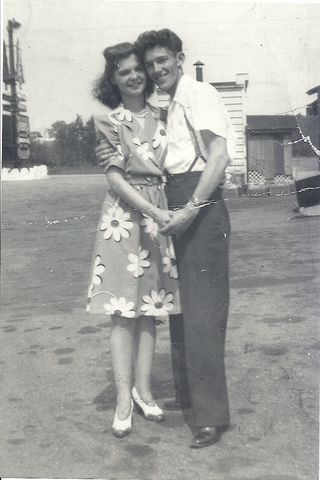Relationships
Is There Really True Love?
To find true love, focus on giving, not receiving.
Posted December 23, 2017 Reviewed by Jessica Schrader

Is there an emotional bond that deserves to be called true love? Is true love possible? In their 1986 hit song, the Judds sang: “Grandpa, take me back to yesterday ... Did lovers really fall in love to stay and stand beside each other come what may?”
The lyrics reflect the declining stability of marital relationships over four decades. Although the U.S. divorce rate declined slightly three years in a row from 2013 to 2016, typical marriages still have only about a 50% chance of lasting. For years, marriage rates declined, in part because young adults have waited longer to get married. Many say that they don’t intend to ever get married.
The belief that love is true when it lasts is not an outdated concept. In her 2015 song, True Love, Ariana Grande describes how her relationship grew into true love from kisses to a commitment to last forever. But how can a person know that a relationship will last forever? Lovers don’t expect that even a genuine relationship will consist only of passionate positive emotions. In 1960, Buddy Holly’s song, True Love Ways, was released posthumously. Written as a wedding gift for his wife, Holly’s song predicted: “Sometimes we’ll sigh; sometimes we’ll cry ... Throughout the days our true love ways will bring us joys to share with those who really care.”
Looking back on his marriage in his song, Remember When, Alan Jackson recounts the ups and downs over the years: “There was joy, there was hurt ... We came together, fell apart and broke each other’s hearts.” Despite it all, Jackson anticipated: “We won’t be sad, we’ll be glad for all the life we’ve had.”
Do conflicting emotions characterize or define true love? In her 2012 song, True Love, pop artist Pink expresses the mixed emotions of her relationship: “Sometimes I hate every single stupid word you say ... At the same time, I wanna hug you.” In fact, Pink explains: “I really hate you so much, I think it must be true love,” because “nothing else can break my heart like true love ... And no one else can break my heart like you.” Despite hurt and heartbreak, Pink identifies her feelings as true love because “without you I’m incomplete.”
In his song, All of Me, dedicated to his fiancée, John Legend also admits to complex emotions: “You’re my downfall, you’re my muse. My worst distraction, my rhythm and blues.” But ultimately completeness is the core of his relationship: “You’re my end and my beginning. Even when I lose I’m winning, ‘cause I give you all of me and you give me all of you.” Do we know a love is true when we don’t feel complete without our lover?
Research suggests that people share a common image of what it means to be loved. Key characteristics of knowing someone loves you include: support without expectation of anything in return, compassion in difficult times, quality time together, being told you are loved, feeling special and appreciated, and being forgiven for something you did wrong. By contrast, people agree that we don’t feel loved when someone is possessive or tries to control us.
But what does it mean to love with a pure or true love? Research has documented a number of different types of love: eros or romantic, ludus or game-playing, storge or friendship, pragma or logical, mania or possessive, and agape or altruistic. Physical attraction and intimacy are central to eros, permissiveness and variety of partners characterize ludus, companionship and stability are the foundation of storge, and compatibility in social and personal characteristics is the core of pragma. Mania is obsessive, dependent, jealous and intensely emotional, whereas agape is altruistic, all-giving, and selfless with no expectation of love in return.
How we love others can vary for different relationships and in various situations. But does one style of loving represent what we envision as true love? While each style illustrates our yearning to find the right person who will satisfy our need to be loved, one—agape—reveals our capacity for what might come closest to pure love. Rather than being concerned with how a relationship benefits us, agape is focused on the best interests of the one we love. It is the love that puts the other first. Researchers identify this style as one in which a person tries to always help their lover through difficult times, sacrifice their own wishes to let their lover achieve theirs, endure all for the sake of their lover, and suffer in place of their lover.
This love is expressed in Freddy Fender’s hit recording of Before the Next Teardrop Falls: “If he brings you happiness, then I wish you all the best. It’s your happiness that matters most of all.” Beyond the emotional, the essence of this selfless love is behavioral commitment: “But if he ever breaks your heart, if the teardrops ever start, I’ll be there before the next teardrop falls.”
The benefits of agape have been highlighted by research. Selfless caring is associated with deep love, intimate communication, relationship satisfaction, loyalty and commitment. Couples in agape relationships are likely to deal more effectively with stress by supporting each other and by dealing with problems jointly, promoting their sense of “we-ness.” Employing healthy coping strategies can deepen commitment and strengthen satisfaction with the relationship.
But are there costs to loving in such a selfless way? What are the psychological consequences of altruistic love? One would anticipate that the strong commitment and deep bond would mean great emotional pain if the relationship fails. As expected, research suggests that the end of such a rich committed relationship can result in feelings of profound loss and sadness. The more rewarding the love, the greater loss. Taking the risk of one day having to pay such a price is inherent in the essential nature of agape as all-giving and selfless.
Is it realistic to think that we can love in such an all-giving, non-demanding way? Research suggests that this style is rarely, if ever, fully actualized. It might well be the ideal we can hope for and strive toward. In searching for true love, we need to redirect our focus and energy from receiving to giving. Research shows that those who practice other-directed love are less likely to ever have to pay the hefty price. Perhaps there is such a thing as true love, and perhaps it can last.
References
Cooper, L. R., & Kurstin, G. (2012). True love [Recorded by Pink (Lily Rose Cooper)]. On The Truth About Love [CD]. New York, NY: RCA Records.
Galinha, I. C., Oishi, S., Pereira, C. R., Wirtz, D., & Esteves, F. (2014). Adult attachment, love styles, relationship experiences and subjective well-being: Cross-cultural and gender comparison between Americans, Portuguese, and Mozambicans. Social Indicators Research, 119, 823-852.
Grande, A. (2015). True Love. On Christmas & Chill [Digital Release on iTunes]. Republic Records.
Hammock, G., & Richardson, D. S. (2011). Love attitudes and relationship experience. The Journal of Social Psychology, 151, 608-624.
Heaven, P. C. L., Da Silva, T., Carey, C., & Holen, J. (2004). Loving styles: Relationships with personality and attachment styles. European Journal of Personality, 18, 103-113.
Hendrick, C., & Hendrick, S. (1986). A theory and method of love. Journal of Personality and Social Psychology, 50, 392-402.
Holly, B., & Petty, N. (1960). True love ways [Recorded by B. Holly]. On The Buddy Holly Story, Volume 2 [Vinyl]. New York, NY: Coral Records.
Jackson, A. (2003). Remember when. On Greatest Hits Volume II [CD]. New York, NY: Arista Records.
Keith, V., & Peters, B. (1974). Before the next teardrop falls [Recorded by F. Fender]. On Before the Next Teardrop Falls [Vinyl]. Nashville, TN: Dot Records.
Legend, J. (2013). All of me. On Love in the Future [CD]. New York, NY: GOOD Music.
O’Hara, J. (1986). Grandpa, tell me ‘bout the good ol’ days [Recorded by The Judds]. On Rockin’ with the Rhythm [CD]. New York, NY: RCA Records.
Oravecz, Z., Muth, C., & Vandekerckhove, J. (2016). Do people agree on what makes one feel loved? A cognitive psychometric approach to the consensus on felt love. PLOS ONE. DOI:10.1371/journal.pone.0152803
Sharma, S., & Ahuja, K. K. (2014). Does love last forever? Understanding an elusive phenomenon among dating and married couples. Journal of Psychosocial Research, 9, 153-162.
Vedes, A., Hilpert, P., Nussbeck, F. W., Randall, A. K., Bodenmann, G., & Lind, W. R. (2016). Love styles, coping, and relationship satisfaction: A dyadic approach. Personal Relationships, 23, 84-97.




